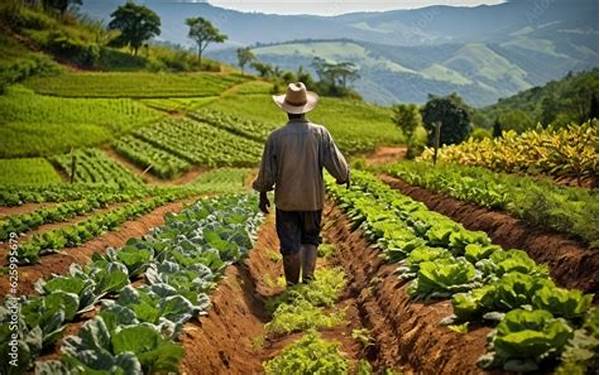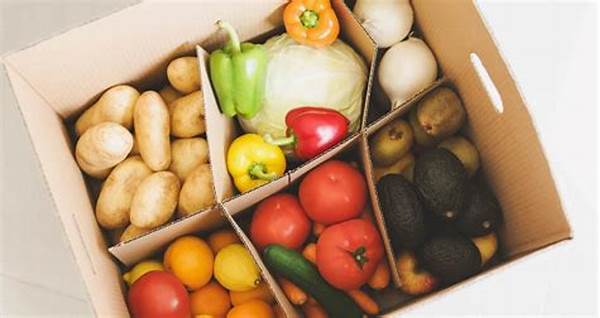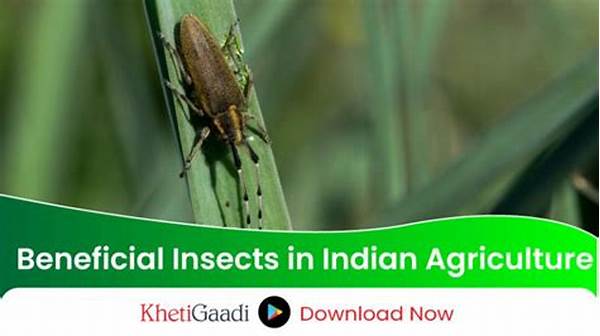In a world where environmental challenges are escalating, embracing organic farming emerges as a beacon of hope for conserving biodiversity. This approach is not just a choice; it’s a necessity for preserving the ecological balance that sustains life on Earth. Transitioning to organic farming isn’t merely about cultivating crops without chemicals; it’s about nurturing ecosystems, supporting wildlife, and ensuring a healthier planet for future generations. The time to act is now, and embracing organic farming is a critical step towards safeguarding our invaluable biodiversity.
Read Now : Life Cycle Assessment Of Dairy Farming
The Role of Organic Farming in Biodiversity Conservation
Organic farming plays a pivotal role in biodiversity conservation by fostering healthy ecosystems. Unlike conventional farming, which often relies on synthetic chemicals and monocultures, organic farming prioritizes natural processes and diverse planting strategies. This method enhances soil health, which is crucial for sustaining a wide range of organisms, including insects, birds, and microorganisms. By choosing organic farming, farmers contribute to the creation of habitats rich in plant and animal species. Such biodiversity not only aids in pollination and pest control but also strengthens resilience against climate change, ensuring food security in the long run. It’s a win-win for both agriculture and nature—a harmonious relationship where the land thrives and wildlife flourishes.
Embracing organic farming for biodiversity conservation is more than an agricultural shift; it addresses the pressing need for environmental sustainability. The reduction of harmful inputs like pesticides and synthetic fertilizers means less pollution in waterways and healthier soils. This, in turn, supports species diversity and ecosystem functions. Through practices like crop rotation, cover cropping, and natural pest management, organic farming fosters a rich tapestry of life that benefits both humans and nature. When supported by policies and consumer choices favoring organics, this approach can transform our landscapes, creating sanctuaries of biodiversity amid agricultural lands.
Furthermore, organic farming’s focus on biodiversity acts as a buffer against the challenges posed by climate change. Diverse ecosystems are more resilient, with varied species providing ecological insurance against climate-related disruptions. By maintaining genetic diversity in crops and promoting varied wildlife species, organic farming helps to stabilize ecosystems and maintain ecological integrity. This proactive stance is essential—without immediate action, we risk losing the biodiversity that forms the bedrock of our existence. Choosing organic farming is to choose a future where nature’s diversity is preserved and celebrated.
Benefits of Organic Farming for Biodiversity
1. Chemical-Free Ecosystems: Organic farming reduces the impact of harmful chemicals on the environment, promoting cleaner air and water essential for diverse life forms.
2. Habitat Creation: Diverse crop rotations and natural vegetation in organic fields provide crucial habitats for a variety of species, aiding biodiversity.
3. Soil Health Improves Biodiversity: Organic practices enhance soil health through composting and other natural methods, supporting a micro-ecosystem teeming with life.
4. Pollinator Support: By avoiding toxic pesticides, organic farms create safer environments for pollinators like bees and butterflies, which are vital for biodiversity.
5. Climate Resilience: Biodiverse organic farms are more resilient to climate extremes, ensuring stability and sustainability of ecosystems.
Strategies to Enhance Biodiversity through Organic Farming
Adopting organic farming for biodiversity conservation entails strategic practices that amplify its benefits. Farmers can implement crop diversity instead of single-crop monocultures to attract and support a variety of wildlife. This practice creates diverse habitats, offering food and shelter to numerous species. Additionally, integrating livestock into organic systems enables nutrient cycling, fosters natural pest control, and supports biodiversity by creating varied ecological niches. Livestock like cattle can graze in pastures rich in wildflowers, benefiting the ecosystem while producing sustainable meat and dairy.
Another significant strategy is using cover crops and green manures, which improve soil organic matter, reduce erosion, and provide habitat for insects and birds. Such practices lead to healthier, more robust ecosystems capable of withstanding climatic shifts. Organic farming’s refusal to use synthetic inputs ensures that nutrients are recycled naturally within the system, enhancing soil fertility and supporting microbial biodiversity. The conscientious choice of organic practices directly influences the vitality and diversity of non-agricultural species, ensuring a thriving ecosystem.
Engaging Communities in Organic Biodiversity Practices
To maximize the impact of organic farming for biodiversity conservation, engaging local communities is essential. By fostering community-supported agriculture, individuals become directly involved in sustainable practices, gaining firsthand knowledge and appreciation of the role organic farming plays in conserving biodiversity. Education initiatives can highlight the benefits of maintaining biodiversity, encouraging community involvement in organic farming practices and wildlife conservation activities.
Read Now : Benefits Of Organic Fertilizers In Cultivation
Local economies also benefit from organic farming as it often involves more manual and skill-intensive labor, creating employment opportunities and encouraging rural development. Community engagement can result in the establishment of local markets where organic produce is valued, supporting the financial viability of organic initiatives. Where citizens are informed and active participants, organic farms transform into community hubs, where biodiversity thrives, and conservation efforts gain momentum through collective action.
Addressing Challenges in Organic Farming for Biodiversity Conservation
While the benefits of organic farming for biodiversity conservation are clear, several challenges must be addressed to maximize its impact. Transitioning from conventional to organic farming requires time, education, and resources. Farmers may face initial reductions in yield and increased labor costs, deterring some from making the switch. However, these challenges are surmountable with the proper support and incentives from governmental and non-governmental organizations alike.
Policies that provide financial assistance, technical training, and access to organic markets can ease the challenges faced by farmers. Moreover, research and development can help mitigate pest issues typically managed with synthetic chemicals by refining natural pest management techniques. As these barriers are overcome, the path to embracing organic farming for biodiversity conservation becomes clearer, ensuring wide adoption and long-term success.
Future Prospects of Organic Farming and Biodiversity
The future of organic farming for biodiversity conservation is bright with the right support systems and global commitment. As consumers increasingly value ecological sustainability, the demand for organic products continues to grow, driving agricultural expansion in this sector. Advancements in organic farming techniques promise to improve yields and profitability, making it an attractive option for farmers worldwide.
In addition, increased awareness and education programs will lay the groundwork for a sustainable future that nurtures biodiversity and human health. As the world unites to combat climate change and biodiversity loss, organic farming emerges as a crucial ally—offering solutions that align agricultural productivity with ecological preservation. Thus, investing in organic farming is an investment in our global future, ensuring that biodiversity can continue to enrich our lives for generations to come.
Joining Forces for a Sustainable Future
The call for sustainable agricultural practices, such as organic farming for biodiversity conservation, has never been more urgent. As we face global challenges, collaboration among farmers, consumers, policymakers, and communities becomes imperative. By joining forces, we can create an agricultural paradigm that honors our planet’s ecological limits, fosters biodiversity, and contributes to climate change mitigation efforts.
With informed decision-making and proactive leadership, organic farming can flourish, offering a template for sustainable agriculture worldwide. The journey demands perseverance and innovation but promises substantial rewards: healthier ecosystems, resilient food systems, and a future where biodiversity thrives alongside human progress. Embracing organic farming is a step towards a future where nature is celebrated, conserved, and integrally connected to our lives.
Bridging the Divide Between Practice and Policy
To effectively implement organic farming for biodiversity conservation, a cohesive relationship between agricultural practice and government policy is crucial. Policymakers must recognize the critical role of biodiversity in ecological health and provide the legislation needed to support organic farming initiatives. Offering subsidies, tax incentives, and technical support can encourage more farmers to transition to eco-friendly practices, making it feasible on a larger scale.
By aligning agricultural policies with conservation goals, we pave the way for an innovative agricultural model that places biodiversity at its core. Collaboration with scientific institutions can further refine organic techniques, ensuring they continue to progress. Ultimately, synergizing policy with practice facilitates a thriving agricultural sector that contributes positively to ecological and social systems, heralding a sustainable future for all.



